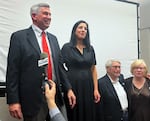
Rene Gonzalez,left, address the crowd at his election party downtown Portland, Ore., after early results show him in the lead, Nov. 8, 2022.
Rebecca Ellis / OPB
In early returns Tuesday night, businessman Rene Gonzalez notched a lead in his attempt to unseat Commissioner Jo Ann Hardesty — and, in the process, push the Portland City Council toward a tougher approach to homelessness and crime.
Gonzalez’s campaign expressed optimism Tuesday night at an election party in downtown Portland at his campaign headquarters.
“We like where we sit,” he told the crowd. “We’ll wait for someone else to make the call.”
Hardesty also kept her supporters in an upbeat mood Tuesday night as the early results trickled in.
“I love this city,” Hardesty told a cheering crowd. “You guys know me. It doesn’t matter what my title is. I’m not going anywhere.”
From day one, the council race was dominated by voter concerns over homelessness and crime — two issues that polls show are top of mind for Portland voters. Gonzalez’s pledge to come down harder on homelessness and crime was well-received by many Portlanders, while Hardesty struggled to convince an angry electorate that proliferating homeless camps and an uptick in crime were not the results of her progressive politics.
If elected, Gonzalez promised voters he would push to hire hundreds more police officers, dramatically ramp up the number of arrests by police for low-level crimes, and try to get the city’s entire homeless population in shelter. He said people living on the streets who refuse to enter a shelter should get a ticket and, potentially, face jail time. Portland leaders approved a controversial plan last week in a similar vein. The plan aims to ban unsanctioned homeless camping and require everyone living on the street move to city-sponsored camping sites.
Hardesty, meanwhile, campaigned on her reputation as the council’s most ardent proponent of more civilian oversight for police. The first Black woman elected to City Council, Hardesty also pointed to her history of advocating for marginalized constituents and establishing successful initiatives like the Portland Street Response, a program that dispatches a team of health workers and paramedics to 911 calls concerning people in a mental health crisis.

Incumbent Portland commissioner Jo Ann Hardesty speaks to a crowd of supporters at The Jack London Revue, a jazz club in downtown Portland, Ore., on Nov. 8, 2022.
Meerah Powell / OPB
Through the tight race, Hardesty held on to support from left-leaning politicians and advocacy groups including SEIU Local 49, APANO, and the Latino Network. U.S. Sen. Jeff Merkley, U.S. Rep. Earl Blumenauer, Multnomah County District Attorney Mike Schmidt, and City Commissioner Carmen Rubio also supported her run for a second term.
Gonzalez, meanwhile, had been endorsed by the editorial boards for the Oregonian, Willamette Week, and the Portland Tribune, as well as the Portland Police Association, the union representing rank-and-file officers, and the Portland Business Alliance, the city’s largest chamber of commerce.
The campaign got increasingly nasty as election day neared. Hardesty had attacked Gonzalez for endorsements he made while leading ED300, a parent advocacy group Gonzalez founded to push for school reopenings during the pandemic. Hardesty, along with some of the city’s progressive leaders, bashed Gonzalez for supporting “extreme candidates” through the endorsement process, pointing to similar candidate endorsements made by groups that had advocated against LGBTQ rights, such as the Oregon Family Council.
Then, with two weeks to go to election day, the Gonzalez campaign sent Hardesty a cease-and-desist alleging her campaign had made “patently false, libelous statements” by accusing him of breaking the law in her campaign literature. Hardesty’s campaign was referring to a fine city election officials had levied on Gonzalez for allegedly accepting rent for his campaign headquarters below market rate in violation of the city’s Small Donor Elections program rules. The fine was later revoked by a state administrative law judge. Hardesty had dismissed the letter as a piece of political theater.
This is a developing story and may be updated.



